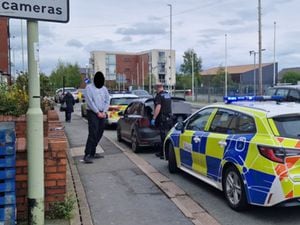Mubarek Ali: This decision is unacceptable – victims must have a voice, says Telford MP Lucy Allan
Telford's MP has said more should have been done to contact victims ahead of the release of one of the ringleaders of Operation Chalice.

Lucy Allan said the community should have more time to heal, after the jailing of seven men for sex offences in 2013.
She has demanded more information as to why the women have not been spoken to earlier and said it is "wrong" that he could be free to return to Telford.
Today she issued the following open letter to the Shropshire Star:
"The perpetrator was given 22 years, of which eight was to be served on licence and 14 in custody. Offenders are normally released after expiry half the custodial sentence.
"In addition the time spent on remand further reduces the sentence in this case.
"Victims and members of the public would have expected a 22-year sentence to mean that the community could have time to heal and victims would be able to get on with their lives.
"What we see in this case is that the one of the main perpetrators is being released into the community only five years after the trial.
"This is clearly of enormous concern to victims in this case, specially those who gave evidence in court. What is unacceptable that in this case there was no attempt by the authorities to reach out these young women and prepare them for this wholly unexpected event.
"Worse, still is the prospect that this person may be returned to Telford and naturally this has caused huge anxiety to victims.
"The Victim Contact Scheme was supposed to be in place in these kinds of horrific crimes, precisely because victims must have a voice.
"They should be entitled to feed into the process by giving their thoughts and concerns and those concerns should be acted upon.
"These young women were brave enough to come forward and give evidence in court twice. It is inconceivable that there were no plans to communicate with them or provide help and support during the release process.
"I want to know why this did not happen in this case. These young women are still coming to terms with what happened to them.
"Given the very short period of time since the court case concluded, it is wholly unacceptable for this individual to be returned to Telford.
"Telford is a town where it would be perfectly possible for victims to run into the perpetrator at any time. How can they be expected to get on with their lives if they are living in fear?
I am working to ensure the victims get the support and information they need and that their views on the terms of the licence are given proper consideration.
"I believe it would be wrong for one of the ringleaders of this horrendous crime to be allowed to return to Telford only five years after sentencing.
"I am following this up with the relevant authorities in Telford and I have written to the Secretary of State for Justice."
MP wants to know how system failed
It is supposed to give victims the chance to have their say on the terms of an offender’s release.
But Telford’s MP Lucy Allan has asked why it hasn’t been used in this particular case. The National Probation Service (NPS) Victim Contact Service (VCS) gives people affected by crime information at key stages in a criminal’s sentence.
The Department of Justice says it is offered to victims of specified violent and sexual offences where the offender receives a sentence of 12 months or more.
The purpose of the VCS is to provide eligible victims with information and advice about the criminal justice process by a designated Victim Liaison Officer (VLO).
This includes being kept informed of key stages of the offender’s sentence, such as transfer to open prison conditions or release, and to make representations about victim-related conditions that can be attached to the offender’s release licence.
If an eligible victim has opted into the VCS and the Parole Board are going to consider the offender’s release or a move to open conditions, they are entitled to be informed by the NPS if a Parole Board hearing is to take place; make representations about licence conditions which could include an exclusion zone or a condition to prevent the offender from contacting the victim or their family, to the Parole Board.
Victims can also be provided with an explanation if a requested licence condition is not included on the offender’s release licence; make a Victim Personal Statement which will be sent to the Parole Board and apply to attend an oral Parole Board hearing to present their statement in cases where the Parole Board decides that it is appropriate to hold an oral hearing. At Prime Minister’s Questions on June 19, Lucy Allan asked why the system had fallen down.
She said: “Does the Prime Minister agree with me that CSE victims should be properly consulted upon the release of perpetrators and, in this case, the perpetrator should not be returned to Telford?”
In response, Theresa May said: “The victim contact scheme is supposed to treat victims properly and it is supposed to ensure consideration is given to victim related conditions when they are looking at an offender’s license.”





